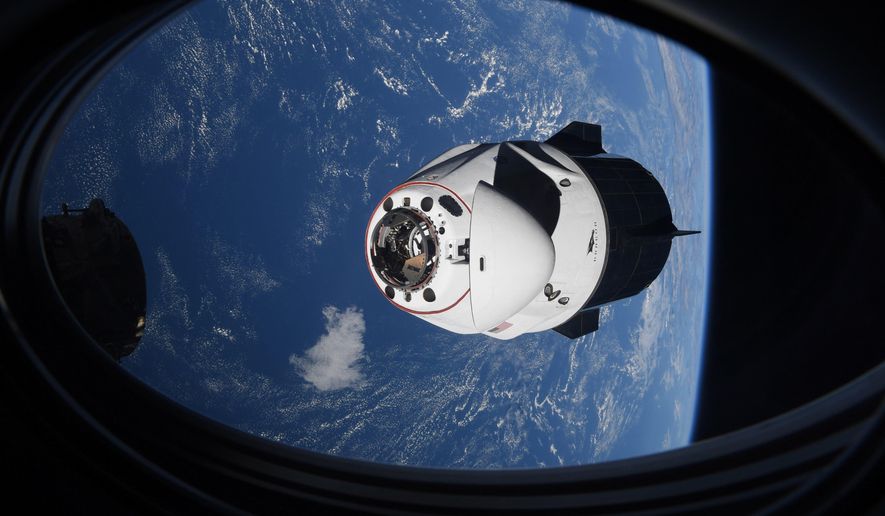America took on the mantle of the world’s policeman in the 20th century, and Congress is now poised to make the U.S. the galaxy’s garbage man in the 21st century.
Legislation moving through Congress would fund the development of capabilities to track space trash and establish a federal office to monitor trash and other objects in space.
Advocates for a more aggressive U.S. effort on that front cite the mounting dangers of space trash. A boom in the commercial space industry and increased space exploration by other countries is cluttering the road to the final frontier with piles of space junk and traffic jams.
Sen. Cynthia M. Lummis of Wyoming, the top Republican on the Commerce, Science and Transportation space and science subcommittee, said she is comfortable being identified as the “space junk lady” because she wants the U.S. to take a lead role in developing space situational awareness, space traffic management and space policy for Earthlings.
An estimated 4,000 satellites are orbiting Earth. About 1,200 of those were launched last year, and more than 1,200 have already launched this year, Ms. Lummis said. Another 46,000 satellites are expected to flood space in the coming years.
The Department of Defense’s global Space Surveillance Network sensors are working to track 27,000 pieces of space junk, NASA said.
“This junk poses huge risks to our assets in space,” Ms. Lummis said at a Senate hearing last week. “Even the smallest pieces of orbital debris, I’ve learned that even paint flecks, can cause serious damage. Each collision creates even more debris, so this is a problem that compounds on itself.”
Sen. John Hickenlooper, Colorado Democrat and chairman of the space and science subcommittee, said a 2007 Chinese weapons demonstration left 3,000 pieces of debris hurtling through space at high speeds and a 2009 U.S. satellite collision with a Russian satellite created 1,800 pieces of debris.
Mr. Hickenlooper said the U.S. cannot afford to wait for the next collision while more public and private objects rush into space.
“On highway traffic, and I realize this is a very loose analogy, but traffic increases up to a certain point and then there is a point where things stop, accidents increase, traffic rate slows dramatically, the system begins to fall apart,” Mr. Hickenlooper said. “And I think in that loose sense this is an analogy that we are rapidly approaching that point, where the dramatic increases in traffic are going to wreak havoc if we don’t address them now.”
Mr. Hickenlooper wants the government to fully implement a space policy directive for traffic management and enact the Space Act. The legislation recently passed the Senate as part of the U.S. Innovation and Competition Act, which focused on fostering research and development to counter China.
The Space Act would allocate $20 million to create “centers of excellence for space situational awareness,” where the government develops capabilities to track space trash, and would authorize $15 million for the Commerce Department’s director of space commerce to develop a situational awareness program.
If the U.S. does not write the rules for space, Mr. Hickenlooper said, the European Union, Russia and China will overrule American interests in space traffic management.
Another force shaping space rules will be the billionaires devoting time and money to the space tourism industry and space colonization efforts. Virgin Galactic’s Richard Branson rocketed to the edge of space this month, and Amazon founder Jeff Bezos this week joined the first crewed ride by his Blue Origin space company’s rocket to the boundary between Earth’s atmosphere and space. Upon return, Mr. Bezos said he intended to help “build a road to space.”
Whether Mr. Bezos’ road gets built likely will depend on governments’ willingness to entrust the risk of exploring space to Mr. Bezos and other commercial space entrepreneurs. The model for such a public-private relationship might be found in the defense sector.
“It’s very exciting. Who would have imagined that the private sector would be leading in space? Certainly, when I worked on these issues in Congress 20 years [ago], nobody could have imagined it,” former Defense Secretary Mark Esper said on CNBC. “But it’s the same kind of transition the defense industry went through years ago where the government was leading it and then the private sector took over.”
To clean up space, the government likely will count on the private sector for assistance, Paul Graziani, CEO of the Commercial Space Operations Center, told the Senate panel.
He warned that if the growing problem of space trash is not resolved soon, then low-Earth orbit soon will become “really unusable.”
• Ryan Lovelace can be reached at rlovelace@washingtontimes.com.




Please read our comment policy before commenting.